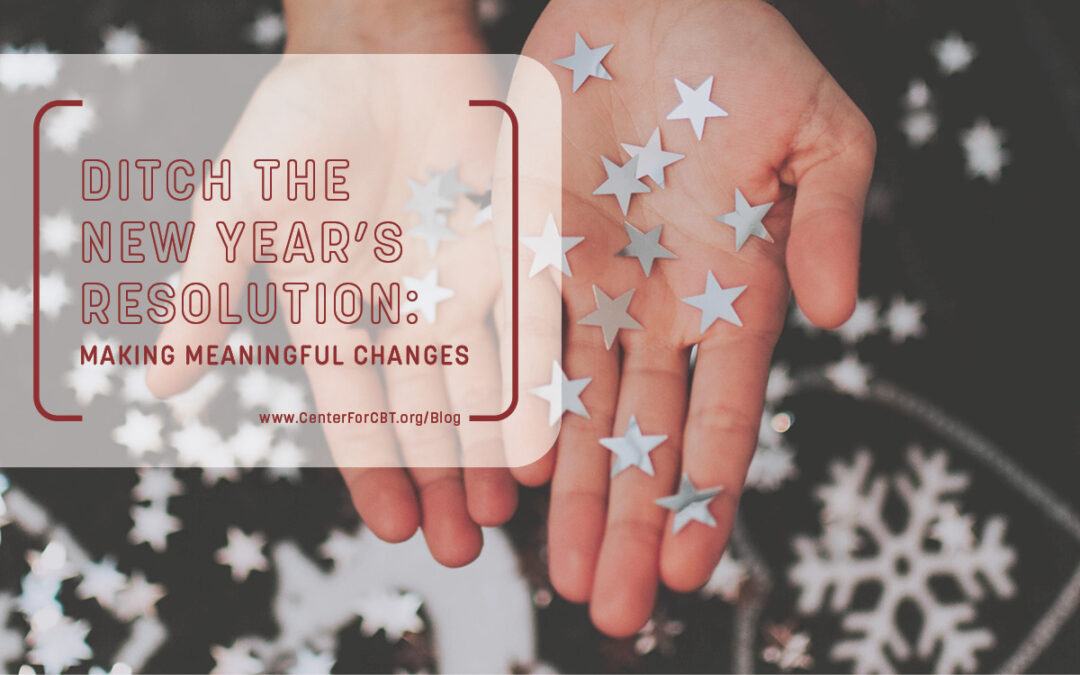When we feel hopeful or optimistic, we are more likely to make New Year’s resolutions, and in turn, more likely to follow through with them. A good resolution that you can stick with has the potential to boost self-confidence and foster a sense of accomplishment. January may stir a sense of optimism in people with the promise of a fresh start, but for most people, the thrill will quickly wear off. The notion of a deadline begets a certain level of pressure this time of year, which means we are less likely to make and stick to a resolution that feels personally meaningful. The definitive nature of the calendar change can make our experiences from 2023 really feel like they’re coming to a head. But significant life changes don’t often happen just because of a date change. They happen because of goal-oriented planning, which can be practiced by implementing cognitive behavior therapy (CBT) skills. Real progress comes with careful planning, honest commitment, and a truthfulness with one’s self that can start at any time of year.
What’s Wrong with Resolutions
The challenge with resolutions is that the types of goals we usually set for ourselves are either impractical, dispassionate, or poorly planned (often, a combination of these factors). This is compounded by the stress that comes with the superficial deadline set by the calendar year. It’s an arbitrary date that doesn’t necessarily align with the reality of our personal timelines and ability to make progress in certain areas of life. Nearly 80% of all New Year’s resolutions are abandoned, with the period between mid-January through February being a notorious time for resolution-makers to jump ship and give up entirely. In fact, recent years have shown a trend in decreased resolution making, with only 37% of Americans having declared a resolution for 2023, which is down compared to some prior years.
The ability to set and achieve a goal, or in this case, a resolution, is behaviorally motivated. This realization leads us to a more effective approach in goal setting, where the focus shifts from broad resolutions to specific, attainable objectives. By implementing CBT techniques, you can lay a structured foundation for yourself that can support you in identifying and achieving specific goals. And ultimately, for a resolution to be successful, it has to be something you’re ready and willing to commit to. This means reframing the way we think, not just about resolutions, but about our life goals in a broader sense. CBT can assist in goal setting by helping to align our aspirations with our thought processes and emotional responses. To make the changes you want to see in your life you might need to ditch your old resolutions and go back to the drawing board with a few key guidelines in mind.
Setting the Right Goals
The most important thing to remember when making a New Year’s resolution is that you should set goals that you are actually excited about. It is easier to commit to a goal when it’s something you feel independently motivated to work on. With any goal you set, it’s important to do so because you truly want to. If you choose a goal because it’s what you think you should do, or if it was set for you by someone else, you may not feel as motivated to work on it. In this process, the essence of goal setting is not just about what we want to achieve, but also understanding why these goals matter to us on a deeper level. This is what results in defunct resolutions. If you’re making the same resolution year after year without much progress, it may not actually be the kind of goal you want to set for yourself.
When deciding on a resolution, it’s a good idea to consider not just what you want to do, but how you want to be. This type of mentality can help you think about the big picture of what you are trying to achieve. Ask yourself questions to help better understand your goals: What kind of life do I want to build for myself? Which values are most important to me? Whatever resolution you choose for 2024, it’s recommended that you only make one, rather than overcommit to multiple different goals.

Putting Your Plan into Action
It can be difficult to follow through with brand new goals, especially if they require a drastic lifestyle change. To start your year off on the right foot, you might consider practicing strategies to help make improvements to your pre-existing goals and routines. Once you have those more under control, it will be easier to take on new tasks. To help yourself get to that point, consider following these key guidelines:
- Start Small. Begin by setting smaller goals to help you reach bigger goals. For example, if you want to start going to the gym four days a week, that’s a big jump, especially if it isn’t already a part of your routine. Starting with a more manageable schedule change, like once a week (or even once a month) can help you ease into the change and work your way up to an increased frequency. Effective goal setting often involves starting with these smaller steps, creating a foundation upon which larger achievements can be built. Succeeding at small, achievable goals can also help you improve your confidence and make it easier to take on bigger goals. Incorporating CBT strategies when setting smaller, achievable goals can help you stick to your plan.
- Be Realistic. When pursuing a goal we are passionate about, some people might tend to be over-eager and too ambitious. Even goals that seem small, like reading two books a month, can easily become derailed if you skip a couple of days. If you fall behind, you’ll feel like you’re playing a game of catch up and you might be more susceptible to the feelings of discouragement that would cause you to give up on your goal. Consider other aspects of your life to determine how you can be practical about adding more to your plate and making changes.
- Stick to a Routine. Outlining a routine can help you stay on track to meet your goals. It’s important to develop a routine for your resolution that works with your current schedule, not against it. Say you want to take more walks but find that you’re too tired by the end of the day. Rather than forcing yourself to stay up later, see if you can work the goal into your morning routine when you’re more alert, or during your lunch break when you might have some extra time.
- Reward Yourself. As important as intrinsic motivation is, it’s okay to indulge in a little extrinsic motivation, too! If your goal is to start waking up earlier, it might help to incentivize yourself with a small reward. This could be a daily reward, like a fancy coffee from your favorite cafe, or a periodic reward after a week of success. This can give you something additional to look forward to and help keep your momentum going. CBT emphasizes the importance of positive reinforcement, making rewarding yourself an essential part of maintaining motivation.
- Find Your Motivation. Deciding on a resolution you’re passionate about is only half the battle. The real challenge comes as time passes, which is when you might start to feel your motivation waning. Remind yourself what you’re working towards, what you stand to gain from sticking to your resolution, and how you’ll feel once you meet your goal. If your resolution includes other people, like spending more time with family, think about how your actions have the potential to positively impact them as well. If someone in your life has a similar resolution, you could partner up to check in with each other, stay on track, and boost motivation. Utilize CBT techniques to continually reassess and strengthen your motivation, ensuring that your resolution remains aligned with your personal growth objectives.
- Take Advantage of Resources. In this day and age, we live very busy lives. It can be easier to stick to a resolution when you have some extra support. A little help doesn’t diminish the value of your progress, it just enables you to reach your goals more easily. Even if your resolution is to reduce screen time, making use of certain productivity apps can help you track your usage and understand where you can adjust. Technology can also help you monitor your mood, gauge your sleep cycles, remind you to complete routine or time-sensitive tasks, help you with meal planning, and more.

Progressing at your Own Pace
You may have heard of the 21 day myth, which claims that you can make anything a habit if you practice at it for three weeks straight. But in truth, building a routine or following through with a resolution can often take longer than this. The truth of the matter is that following through with any commitment takes a significant amount of mental and emotional effort. Shaping your own behaviors, and those of your children, takes time and repetition. It’s important to remember that progress is not linear, and setbacks are a natural part of the growth process. At times it may feel difficult to follow through with your resolution despite your motivation and commitment. At the end of the day, it’s ultimately about persistence over consistency.
Even if you do meet your goal, there are some instances in which you might back slide. And that’s okay! Some things are out of our control, and we need to accept the things that cannot be changed in order to continue moving forward. When you have trouble meeting your goals, what really counts is that you keep trying and maintain faith in your ability to reach them. Letting go of any feelings of guilt you may have from not moving at the pace you expected is a big part of this. There is still time to try again. And remember, the New Year is a day just like any other. It won’t make-or-break your progress in life if you decide to postpone this year’s resolution or forgo it all together. Any period that feels right to you is a good time to start making the changes you want to see in yourself and your life.
Following Through with Your Resolution
If you find you need more support along the way, you might consider finding a therapist who you feel could help you through your journey. A CBT therapist can help you identify small steps to reach your bigger goals, apply new skills and strategies, and support you through the changes you strive to make.
With any resolution that you set your mind to, being more aware of yourself and your reality can make it easier to understand what you truly want to achieve. Incorporating small practices into your routine, like mediation, mindfulness, or even just finding more time for yourself, can help keep you grounded. Putting yourself in a calm, healthy, or wise mindset can help you recognize what you want out of life and how you can take actionable steps towards those goals. Even small goals are worthwhile, and a good place to start to help set yourself up for success.


